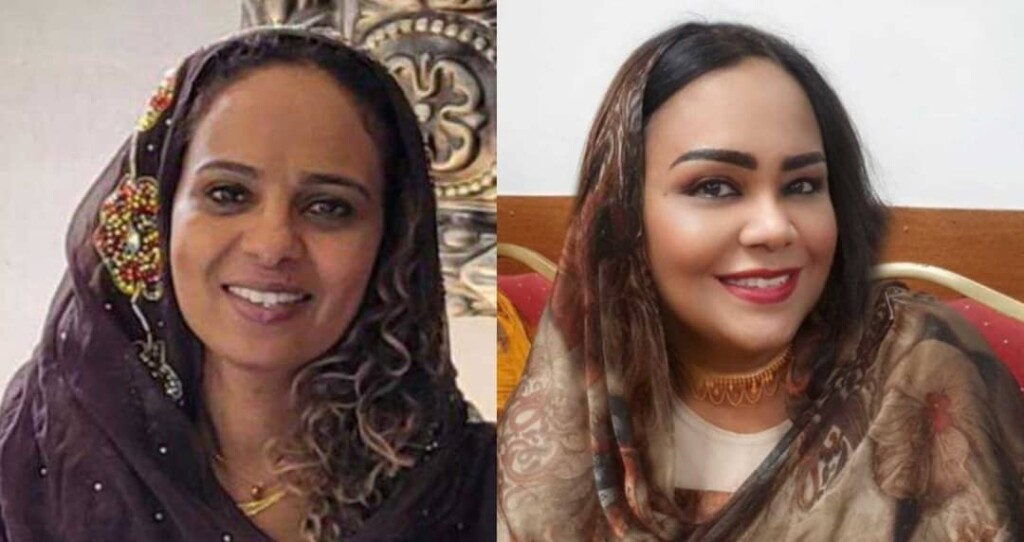Int’l Women’s Day in Sudan commemorated, not celebrated

Medical doctor Nada Sayed and poet Nawal El Sheikh (Photos: Supplied)
On the occasion of International Women’s Day today, Radio Dabanga talked with women’s rights activists Jalila Khamees and Zeina Osman, medical doctor Nada Sayed, and poet Nawal El Sheikh about the situation of Sudanese women, men, families, and society in light of nearly 11 months of war in Sudan.
“It may be clear to all that the situation in Sudan does not allow celebrating International Women’s Day,” Jalila Khamees, originally from the Nuba Mountains in South Kordofan told Radio Dabanga yesterday.
Khamees, who lived in Khartoum when the war between the Sudanese Armed Forces (SAF) and the Rapid Support Forces (RSF) broke out, fled from the violence last year and found refuge in Kassala.
“About 80 per cent of the women who lived in the Sudanese capital are now displaced or fled the country, while those who remain are caught between the warring parties,” she said.
“The women in Darfur have been suffering from the violence for a much longer time. Most of them are surviving in camps set up after civil war broke out 2003. Those in the Nuba Mountains have been facing war on and off for decades and are now again affected by the war. Many women and girls in Darfur and Kordofan have lost their lives since April 15 last year. They were subjected to abductions and sexual violence, and millions are now surviving in shelters without receiving aid.”
“May security and stability return to the women of Sudan,” the women’s rights activist exclaimed.
Eastern Sudanese feminist Zeinab Osman told Radio Dabanga from Port Sudan, capital of Red Sea state, that the women in the region are unable to celebrate International Women’s Day, “not only because of the difficult economic conditions women are going through, but also because of the restrictions and emergency orders imposed by the authorities, under which gatherings were prohibited”.
Osman expressed her solidarity with “all women in affected by this war”. She lamented “the weak representation of women in politics, especially in decision-making positions” and said she hopes that “women in eastern Sudan will gain their rights to play their role in civil society”.
Nurture
Nada Sayed, a doctor working in the field of family medicine,criticises “the education we receive. Our Sudanese society in most cases makes a sharp distinction between women and men, between girls and boys. Sudanese shame boys for crying and expressing their feelings in public, including love, assuming that this contradicts the principles of strength and toughness that should characterise a man’s personality.
“The irony here is that wars, since ancient times, are fuelled and led by men, and women are quenched in their flames,” she told Radio Dabanga reporter Ibrahim Hamouda .
The medic said she fears for the consequences of the war on the mental health of the people in Sudan, and in particular on young people and children. “A dark fate awaits them, as post-traumatic stress symptoms will appear later. The many young women and girls who have been raped during this war, will not only need professional treatment but also a lot of love to avoid the effects of the trauma they have been exposed to.”
Sudanese poet Nawal El Sheikh also talked about the importance of giving love. “Our way out of life and its current pressures and the war we are living through is love, because it gives the impetus that resists bitterness.”
She also criticised education in Sudan, “in particular with regard to the idea of love in our society.
“It seems the Sudanese people are afraid of everything that symbolises love. For instance, when I send someone a heart emoji in a social media message, this leads to confusion and perhaps misinterpretations,” she explained.
“Today, our country is witnessing war with all its horrors. There are great needs, lack of money, and sombre moods. Yet, of this does not make love lose its meaning, on the contrary. We only got rid of the veil of romance that has imprisoned the concept of love in our current civilisation since the eighteenth century.
“When you love, it grows green, flourishes, and blossoms like a flower. Love is green and family love is a safety valve,” the poet concluded.











 and then
and then